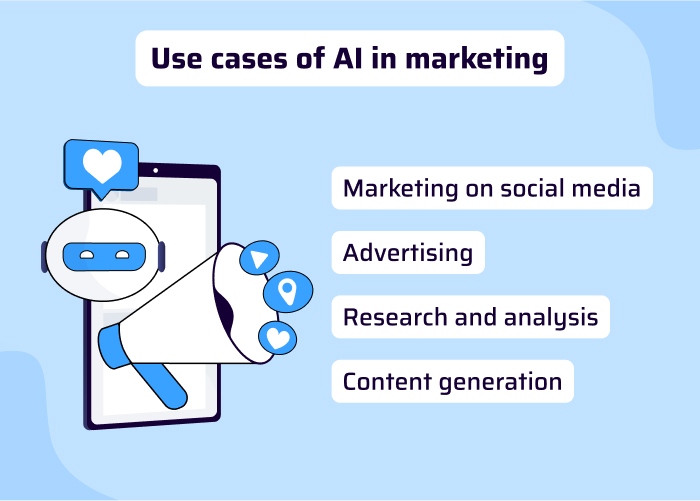Use cases of AI in marketing

- Marketing on social media: Companies use algorithms to assess large datasets, which enables them to target audiences, provide customized content, and increase consumer interaction. Social media is transformed by AI for marketing because it can more accurately interpret user behavior, trends, and attitudes.
- Advertising: Businesses can enhance their marketing campaigns using predictive analytics and ML. Companies can easily target audiences and track performances.
- Research and analysis: AI-powered marketing has improved market research and allows companies to gain important insights and make wise decisions.
- Chatbots: One of the useful applications of AI in marketing is chatbots. Product recommendations become easier and chatbots help in improving the customer experience.
- Content generation: AI-generated content helps in improving the digital marketing strategy and allows extra time for other important tasks.
Advantages of AI in marketing
AI offers numerous advantages in marketing, revolutionizing the way businesses understand, engage with, and retain customers. Some key advantages include:
- Personalization: AI enables hyper-personalized marketing efforts by analyzing vast amounts of data to understand individual preferences, behaviors, and buying patterns. This allows marketers to deliver targeted content, recommendations and offers tailored to each customer, thereby increasing engagement and conversion rates.
- Predictive Analytics: Marketers can use these predictions to anticipate customer needs, optimize marketing strategies, and make data-driven decisions, ultimately improving campaign effectiveness and ROI.
- Automation: By streamlining the processes, marketers can save time and resources, focus on high-value activities, and ensure consistent and timely communication with customers across various channels.
- Enhanced Customer Experience: AI-driven chatbots and virtual assistants provide instant support and personalized recommendations to customers, improving overall satisfaction and retention.
- Data Analysis and Insights: AI algorithms can analyze large volumes of data quickly and accurately, extracting valuable insights that would be challenging for humans to identify manually. Marketers can use these insights to understand market trends, customer preferences, and competitor strategies, enabling them to refine their targeting, messaging, and product offerings.
- Optimized Advertising: AI-powered algorithms optimize digital advertising campaigns by analyzing performance metrics, audience demographics, and user behavior in real time.
- Content Creation and Optimization: AI tools can generate and optimize content, including blog posts, product descriptions, and social media updates, based on audience preferences and SEO best practices.
- Competitive Advantage: Businesses that leverage AI in marketing gain a competitive edge by staying ahead of market trends, delivering personalized experiences, and optimizing marketing campaigns for maximum impact.
Conclusion
The integration of AI in marketing has revolutionized the way businesses connect with their target audiences, analyze data, and optimize campaigns. By leveraging AI-powered tools and technologies, marketers can gain deeper insights into consumer behavior, personalize messaging at scale, streamline workflows, and improve ROI.
From predictive analytics to chatbots and recommendation engines, AI offers a multitude of benefits that empower marketers to make data-driven decisions and deliver more impactful and personalized experiences to their customers. As AI continues to advance, its role in marketing will only become more prominent, driving innovation and efficiency in the ever-evolving digital landscape.
FAQs
What is AI in marketing?
What are the benefits of AI in marketing?
1. Improved targeting and personalization
2. Enhanced customer engagement and experience
3. Automation of repetitive tasks and workflows
4. Real-time data analysis and insights
5. Optimization of marketing campaigns for better ROI
6. Predictive analytics for forecasting and decision-making
How does AI improve targeting and personalization in marketing?
Can AI help with content creation and optimization?
Are there any ethical considerations with AI in marketing?
Ravi Bhojani is the Chief Marketing Officer (CMO) at Alian Software, where he spearheads the company’s marketing strategies and drives its brand presence in the competitive IT services landscape. With over a decade of experience in the technology and marketing sectors, Ravi has consistently demonstrated his ability to blend innovative marketing techniques with deep industry knowledge to deliver outstanding results.